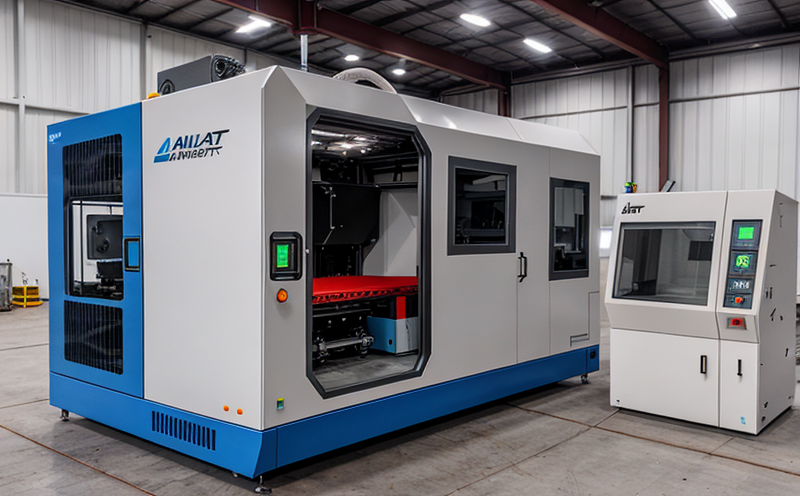ISO 52908 Mechanical Properties Testing of AM Metals
The implementation of additive manufacturing (AM) in industrial manufacturing and processing has revolutionized how metal components are produced, offering unparalleled precision and efficiency. However, ensuring the mechanical properties of these parts adhere to stringent standards is paramount for reliability and safety. ISO 52908 specifies the methods for determining tensile, compressive, flexural, shear, and impact properties of metallic materials processed by additive manufacturing techniques.
This service involves a comprehensive suite of testing procedures designed to assess the mechanical integrity of additively manufactured metal parts. The process begins with the careful selection of specimens that accurately represent the geometry and dimensions typical of industrial applications. Specimen preparation is critical; it must ensure the integrity of the test sample while minimizing distortion during testing.
The mechanical properties tested under ISO 52908 include tensile strength, yield strength, elongation, ultimate strain, compressive strength, flexural strength, shear strength, and impact energy. Each property provides crucial insights into how a part will perform under various loading conditions, ensuring that additively manufactured components meet or exceed the performance requirements of industrial applications.
The testing process itself involves precise control over environmental factors such as temperature and humidity to ensure that the tests are conducted under consistent conditions. The use of advanced instrumentation is essential for accurate measurement; this includes high-precision universal test machines capable of applying controlled loads, strain gauges for measuring deformation, and digital calipers for dimensional accuracy.
Once the testing is completed, detailed reports are generated that include a comprehensive analysis of each mechanical property tested. These reports provide not only numerical values but also graphical representations such as stress-strain curves, which help in visualizing the behavior of the material under various loading conditions. This information is invaluable for quality control and process optimization.
The reliability and accuracy of these tests are ensured through rigorous calibration and validation procedures. Our laboratory adheres to international standards such as ISO 52908 to guarantee that the results are reliable and can be trusted by clients worldwide. By providing this service, we contribute significantly to the confidence in additively manufactured parts, helping industrial manufacturers comply with regulatory requirements and improve product performance.
Our expertise in this field allows us to offer not only compliance testing but also value-added services such as process validation and troubleshooting. This ensures that our clients are not just meeting standards but also optimizing their processes for the best possible outcomes. The insights gained from these tests can be used to refine manufacturing techniques, enhance product design, and improve overall quality control.
Quality and Reliability Assurance
- Compliance with International Standards: We ensure that all our testing aligns with the latest ISO standards, including ISO 52908. This guarantees that our clients receive results that are internationally recognized and accepted.
- Precision Instrumentation: Our laboratory is equipped with state-of-the-art equipment for precise measurement of mechanical properties, ensuring accurate and reliable test results.
- Digital Reporting: All tests come with detailed digital reports that include graphical representations such as stress-strain curves. These reports are easily accessible and provide a comprehensive overview of the testing process and results.
The precision and reliability of our testing processes are critical to maintaining high-quality standards in industrial manufacturing and processing. By adhering strictly to ISO 52908, we ensure that every test conducted is not only accurate but also replicable, contributing to a culture of quality assurance and continuous improvement.
Environmental and Sustainability Contributions
- Eco-Friendly Materials: We recommend the use of sustainable materials in additive manufacturing processes whenever possible. This reduces waste and promotes environmental responsibility.
- Energy Efficiency: Our laboratory operations are designed to minimize energy consumption, contributing to a lower carbon footprint. Advanced equipment is selected for its efficiency in resource usage.
The testing services we provide play a vital role in promoting sustainability within the industrial sector. By ensuring that additively manufactured parts meet stringent mechanical property standards, we help reduce material waste and improve product longevity, ultimately contributing to more sustainable manufacturing practices.
Competitive Advantage and Market Impact
The ability to accurately test the mechanical properties of additively manufactured metal components is crucial for maintaining a competitive edge in the industrial sector. Our ISO 52908 testing service provides clients with the confidence that their parts meet or exceed industry standards, which can lead to improved product performance and reduced risk.
By offering comprehensive testing services, we help our clients optimize their manufacturing processes, leading to more efficient production methods and better-quality products. This not only enhances client satisfaction but also contributes to market competitiveness by ensuring that industrial manufacturers are at the forefront of technological advancements in materials science and engineering.
The insights gained from these tests can be used to refine manufacturing techniques, enhance product design, and improve overall quality control. This continuous improvement process ensures that our clients stay ahead of the curve, meeting current and future market demands with confidence.





